
A recent analysis by Pew shows how government-imposed measures have led to even further and growing divisions in nations where there was already substantial social divisions. Pew surveyed 18,850 adults living in 17 advanced economies between February 1 and May 26, 2021; nations in the study included the United States, Canada, the United Kingdom, Spain, Sweden, France, Germany, Belgium, Italy, the Netherlands, Greece, Japan, South Korea, Singapore, Taiwan, Australia and New Zealand.
Let's dig into the data. There has been a sharp increase and ongoing growth in the share of people who believe that their nations more divided than before the pandemic as shown on these graphs:
A median of 34 percent of respondents feel that their nation is more united compared to almost 60 percent who feel that their nation is more divided than prior to the pandemic.
Here is a graphic showing what percentage of the population of each nation in the survey felt that social division has increased or decreased during the pandemic:
On an overall basis a median of 61 percent believed that their nation was more divided with only 34 percent believing that their nation was more united. In both Western Europe and North America, the majority of respondents believed that their nation was more divided with a high of 88 percent of Americans believing that the United States was more divided now than before the pandemic. In general, outside of South Korea and Japan, substantially more people believed that their nation was more united since before the COVID-19 pandemic. When compared to a poll done in August 2020, the number of respondents in both Canada and the United States who believed that their nation was more divided increased by 32 percentage points and 11 percentage points respectively as shown here:
Other nations with significant increases in respondents who believed that their nation was more divided since August 2020 also include Japan (up 32 percentage points), the Netherlands (up 30 percentage points), South Korea (up 25 percentage points) and Germany (up 23 percentage points).
Pew notes that one of the sources of the divisions is how people felt about the government-mandated non-pharmaceutical interventions (NPIs) (i.e. masks, lockdowns, quarantining etcetera) in their nation. Overall, 41 percent feel that there was the right amount of restrictions, 18 percent felt that there should have been fewer restrictions and 37 percent felt that there should be more restrictions. Here is a graphic showing how the perception of NPIs was for each of the advanced economies in the survey:
As you can see, overall, the majority of respondents in the South Pacific nations felt that there was the right amount of restrictions with the exception of Japan where only 25 percent felt that there was the right amount of restrictions and 62 percent felt that there should have been more restrictions, the highest among all nations in the survey. People living in Europe were more likely to think that restrictions were about right when compared to people living in Canada or the United States where only 27 percent and 17 percent respectively felt that the degree of restrictions was about right.
Let's look at the percentage of the population of eight Western European nations who felt that their government had done a "good" or "bad" job of responding to the COVID-19 pandemic:
Note that respondents living in the United Kingdom were the only nationals among the Western European nations in the survey who assessed their government's response to the pandemic more positively as time passed.
Let's close with this graphic that shows how political affiliation affects peoples' belief in whether fewer restrictions should have been imposed by governments as a response to the pandemic:
Those who lean to the political right (with the exception of Greece) are significantly more likely to believe that there should have been fewer government-imposed restrictions, particularly in the United States where there is a 45 percentage point difference between those who lean to the right and those who lean to the left politically.
Let's close this posting. Anecdotally, in perusing the social media accounts and blogs of many people, we see a very significant number of reports of people who are no longer talking to friends or family because their views on the pandemic are so widely different. It is quite clear that there is a growing divide on the appropriateness of governments' responses to the pandemic and, in particular, the use of vaccines. If one of the incidental aims of the ruling oligarchy was to divide and conquer their respective citizens during the pandemic, they should consider their unprecedented social experiment a resounding success.
You can publish this article on your website as long as you provide a link back to this page.

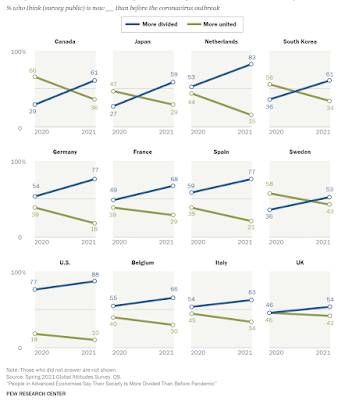
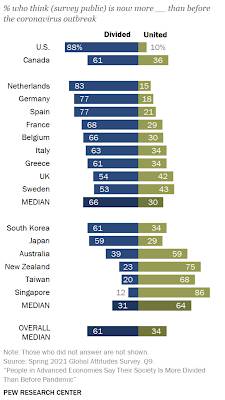
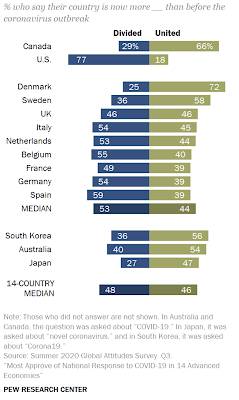
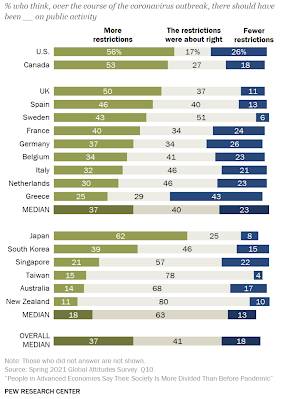
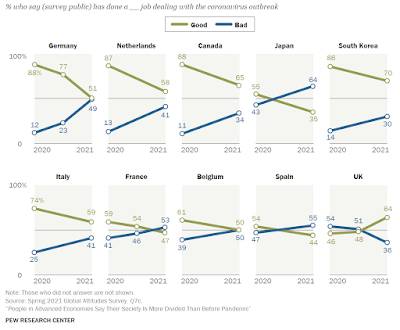
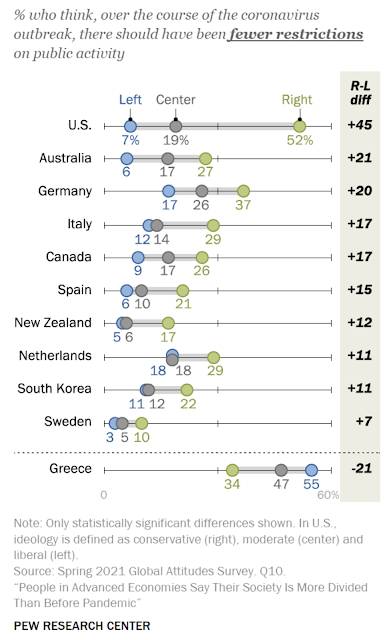
Be the first to comment